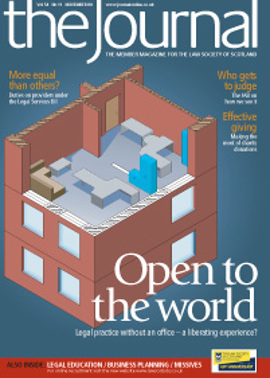Justice on the green front
Lord Gill’s review of the civil court system has the potential to provide a fairer system to help deliver environmental justice in Scotland.
Lord Gill has recommended a number of changes to judicial review. First, he has recommended changes to standing, suggesting that the test of title and interest be replaced by a test of sufficient interest. Noting that this is a “low test”, and rejecting the argument that a lower threshold would result in the floodgates being opened, Lord Gill's suggested sufficient interest test would allow anyone with a material interest, with a real (as opposed to an academic) point to be determined, to bring a case for judicial review.
He also noted that "sufficient interest" operates as the test in England without large numbers of more abstract claims being brought.
Protection from costs
The second main recommendation is on cost of litigation. Protective costs orders have been granted in England for a number of years; the cases now are not about the principle of such orders but rather the precise scope and application of orders to areas such as private nuisance.
The leading case is R (Corner House) v Trade and Industry Secretary [2005] 1 WLR 2600. This case set out various criteria for determining whether an order limiting liability for expenses should be made. Crucially the courts in England grant such orders at the beginning of the litigation to give certainty about the subsequent legal process.
Although Lord Glennie in the case of McArthur, Black & Kennedy [2005] CSOH 165 ruled that such orders limiting liability for expenses were competent in Scotland, no such orders have to date been granted in Scotland. In fact the Inner House suggested that such orders should be subject to wider consultation by the Rules Committee or a wider review prior to use in Scotland. Lord Gill has recommended criteria be drawn up to allow such orders in Scotland, suggesting the use of factors including the fairness on both parties to granting an order.
Rights under Aarhus
What is interesting about the Gill Review is its reliance on the Aarhus Convention in proposing such recommendations. The Aarhus Convention was adopted on 25 June 2008 by the United Nations Economic Council for Europe, and broadly speaking provides individuals and NGOs with three sets of procedural rights.
First, the Convention gives rights to environmental information held by public authorities and bodies controlled by public authorities. Secondly, it guarantees rights of public participation in decision-making in certain decisions and in plans and programmes. Thirdly, the Convention gives rights to challenge environmental decision-making. It is this third right that many signatories have found the most challenging to implement, and which proved controversial enough to mean that an EU directive on the topic has not proceeded beyond the draft stage.
However, it should be noted that there is some doubt whether protective costs orders in their current form in England meet the criteria of Aarhus, and some careful thought will need to be given to the test to be set down in Scotland.
If Lord Gill’s recommendations are implemented, such reforms are unlikely to lead to a flooding of the courts with claims of little merit. Even if a form of orders limiting liability for expenses is drawn up, there will always be a cost to taking a judicial review and it is likely that only a few additional environmental cases will be brought each year. However, the use of the courts to rule on such cases fits within the premise of Aarhus – that the environment is best protected where the process is transparent, open to a range of views and the subsequent decision can be challenged.
In this issue
- The equality, diversity and discrimination agenda: change and challenge ahead
- Justice on the green front
- Let the light in
- Needs of the family
- Reality on the West Bank
- Outside of the box
- Effective philanthropy
- Case for the defence
- Taking on the system
- Same rules for all?
- The benchmark
- Law reform update
- From the Brussels Office
- Appreciation: David Hector MacNeill
- Halfway to the Big Bang
- The same but different
- Five steps forward
- Ask Ash
- Preparing for disaster
- Rules a-changing
- Fair competition
- Time on whose side?
- 40 days and 40 nights
- Hear the grown-ups
- Problems of transition
- Scottish Solicitors' Discipline Tribunal
- Website review
- Book reviews
- Life on the other side
- Never waste a good crisis






